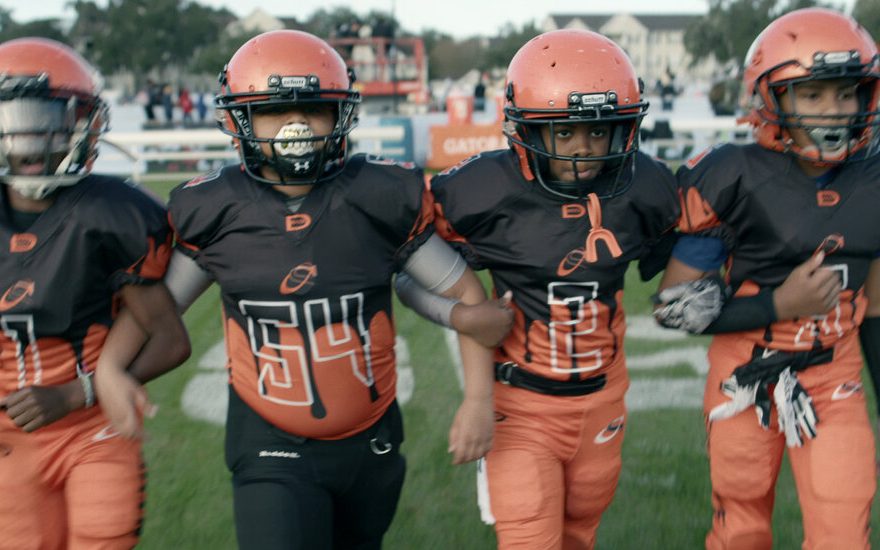One of the more obnoxious phrases in public discussion these days is “Stick to sports,” the conversational penalty flag thrown when an athlete or coach or commentator takes a knee or makes a political statement. The slogan implies that sports can and should be neatly severed from everything else that matters in the world. Lighten up. It’s just a game.
But sports are never only about sports. Just for starters, they’re about opportunity, representation, character, race and caste, fairness and justice — about who gets an equal playing field.
All of these and more are the subjects of “We Are: The Brooklyn Saints,” a heart-stealing four-part docu-series, arriving Friday on Netflix, about boys’ youth league football in East New York. And you don’t need to know your offsides from your onside kicks to appreciate it.
Like “Friday Night Lights,” “Last Chance U” and “Cheer,” “Saints” is less a story about competition than about community. Here, the community is an inner-Brooklyn neighborhood whose adults banded together to restore a football program after a police-athletics league fell to budget cuts.
For the little kids in big shoulder pads, aged 7 to 13, the bruising games and practices are a chance for fun and glory. For the adults, the league can give their children structure, guidance and a shot at affording college. “Our goal is, every season we save a life,” one coach puts it.
So to these boys, growing up in a world that stereotypes Black and Hispanic men as problems or threats, the coaches stress resilience and emotional growth as much as tackling. You hear it in the “I love you”s at every practice and in the call-and-response chants: “Who the show?” “We the show!” “Am I my brother’s keeper?” “You already know!”
The director, Rudy Valdez, is adept at shifting between the child’s-eye and adult’s-eye views, both visually — the camera hustles bumpily around the field to keep up with gameplay — and narratively. The cinema-vérité storytelling captures the young players’ sense of possibility and their coaches’ efforts to prepare them for life’s pitfalls, which the grown-ups know firsthand.
Valdez builds out a winning cast of characters among the kids. There’s D-Lo (short for Dalontai), quarterback for the Saints’ 9U (age 9 and under) team, who’s confident and upbeat but already feels the weight of responsibility. He tells a teammate that he’s sad to be aging out of the division. “When you get older,” he says, “You can’t even play around like you normally do.”
D-Lo’s teammate Aiden is an instant charmer, with a connection to the camera and a precocious gift for self-reflection. “I know I can do better,” he says after a rough practice, “but I don’t yet find it in me.”
The series spends less time with the older Saints squad, but we grow close to Kenan, a middle-school-aged star player who wants to be an engineer and is torn between choosing a high school with a great football program and another one known for robotics. Even with players this age, there’s a consciousness of how the sports system can exploit young men. “Use football,” a speaker at one high school tells prospective students. “Don’t let it use you.”
The parents and coaches, meanwhile, balance nurturing the kids’ dreams with the problem of daily life. On the field, Coach Gawuala is a big-hearted, emotional cheerleader; the players look up to him as their “hype man.” Off the field, he has lost his job and is anxious about supporting his own family.
Gawuala’s signature encouragement is to pull a struggling player close and tell him, “It’s me and you against the world.” Part of the power of “Saints” is how it balances what “the world” means for the kids versus what it means for the grown-ups preparing them to someday live in it.
The young players get a glimpse of this world as they ride to a game on Long Island, on a bus with a leaky roof, past big suburban homes with broad green lawns. (Another team from the area, we’re told, once forfeited a game because they didn’t want to go to Brooklyn.)
Later, a practice is disrupted when the police arrest a coach — Coach Vick, D-Lo’s father — on what turns out to be a minor traffic charge, the kind of aggressive policing that tends to stomp harder on neighborhoods like this one. It’s a gutting contrast between the world of the practice field, where the coaches are respected and honored and trusted, and the reality on the other side of the chain-link fence.
At just four episodes, “Saints” is rare among docu-series today in not feeling stretched out. I could imagine a longer version that spent more time with the players and coaches at home. But there’s something to be said these days for a series that leaves you wanting more.
It can be rough watching these small kids in low moments — not to mention seeing them get knocked around and injured, a concern “Saints” addresses only occasionally. But for all this, the series has a hopeful core. It’s not a tale of social woes so much as a portrait of the support systems that people develop, or improvise, to get by.
An athletics program goes away, so you make one. College is exorbitant, so you spend long days shuttling a child to football practices that might yield a scholarship. On that bus trip to the suburbs, Coach Gawuala tapes a patch on the leaky roof, joking: “Puerto Ricans is nice with tape. We can fix anything with tape.”
It should not come down to this, of course. Kids should already have equal opportunity, college should be affordable, it should not rain inside the bus. But this is where we are. Beyond the wins and losses, “We Are: The Brooklyn Saints” says, a team like the Saints is a kind of social duct tape, helping a community stick together.
Source: Read Full Article

